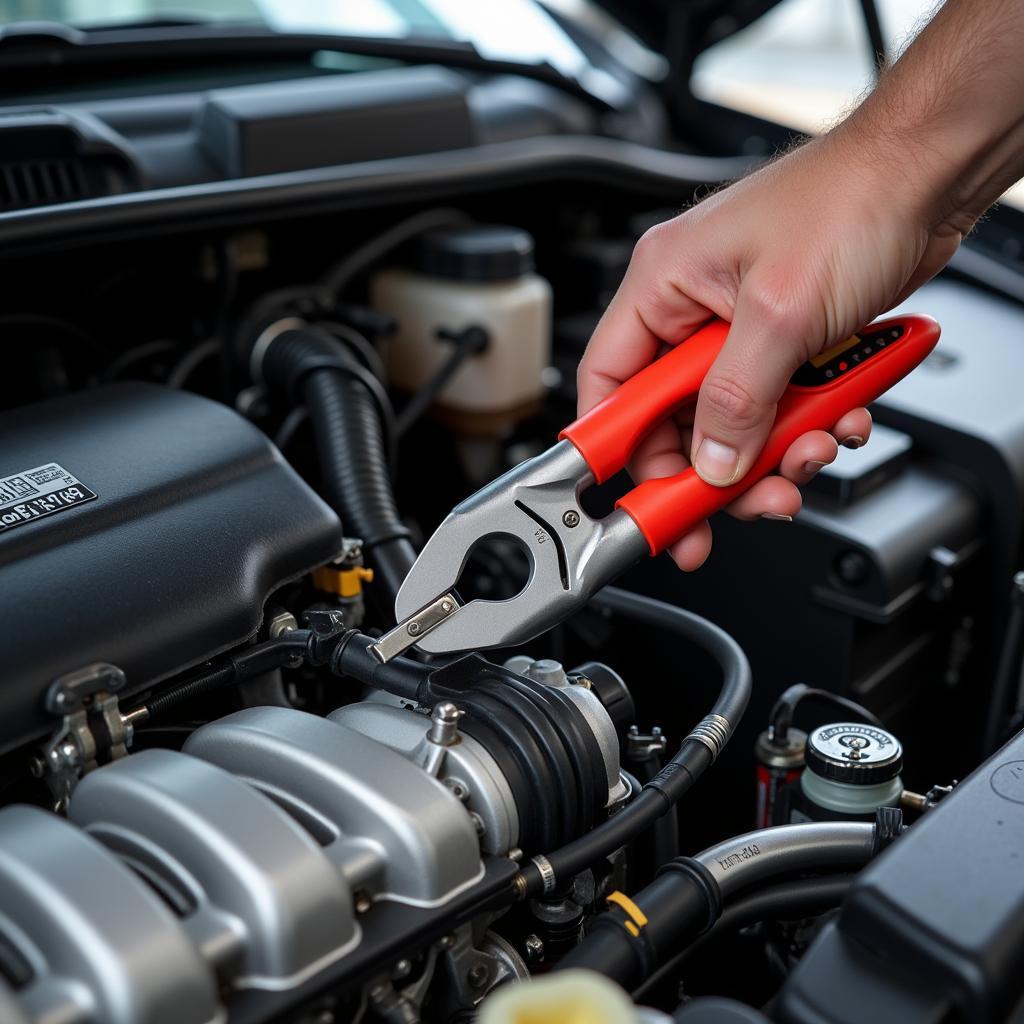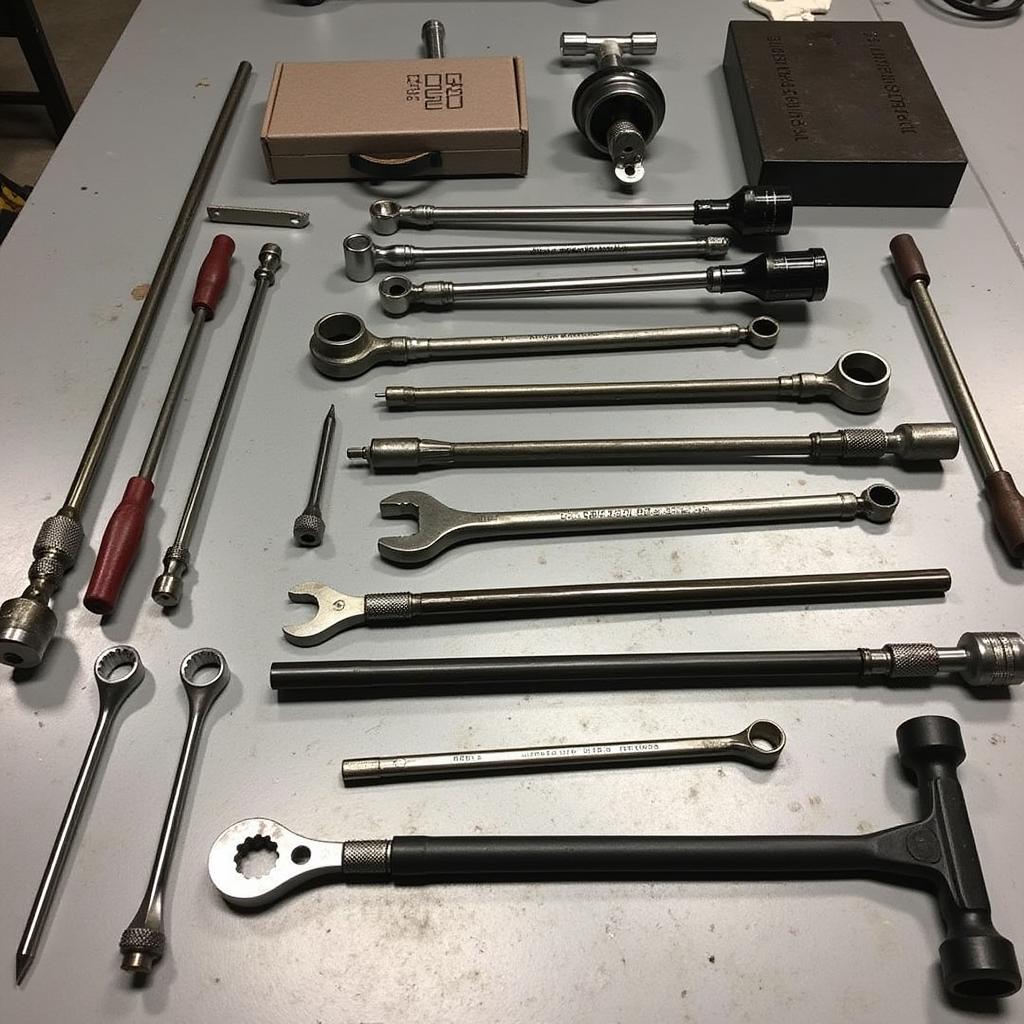Working on modern cars and trucks often requires more than just a basic wrench set. Many vehicles now incorporate complex systems and specialized components that demand specific tools for proper diagnosis, repair, and maintenance. This reliance on special tools is a significant factor for both professional mechanics and DIY enthusiasts working on cars and trucks.
 Specialized Tools for Modern Engine Repair
Specialized Tools for Modern Engine Repair
Why Do Some Cars and Trucks Need Special Tools?
Modern vehicles are increasingly sophisticated, packed with advanced technology to enhance performance, safety, and fuel efficiency. These advancements necessitate specialized tools designed to interact with these intricate systems without causing damage. Think about working on a high-pressure fuel injection system or a complex anti-lock braking system – you wouldn’t want to use a generic tool and risk damaging expensive components. For instance, certain European cars may require specific car ecu programming tool for software updates or diagnostics.
Examples of Cars and Trucks Requiring Special Tools
-
European Vehicles (BMW, Mercedes-Benz, Audi, Volkswagen): Known for their sophisticated engineering, these vehicles often require specialized tools for tasks like resetting service lights, accessing electronic control units, and performing complex diagnostic procedures. Even routine maintenance like brake pad replacements can require specific tools due to the unique caliper designs.
-
Domestic Trucks (Ford, Chevrolet, Ram): Heavy-duty diesel trucks often require specific tools for tasks like injector removal and installation, fuel system priming, and transmission service. Their robust construction and powerful engines often necessitate tools designed for high-torque applications.
-
Hybrid and Electric Vehicles (Toyota Prius, Tesla Model S): These vehicles present unique challenges due to their high-voltage electrical systems. Specialized insulated tools are crucial to prevent electric shock and ensure safe handling of these systems. Additionally, diagnostic software tailored to hybrid and electric powertrains is essential for troubleshooting.
What Types of Special Tools are Commonly Needed?
Specialized tools cater to various automotive systems and tasks. Some examples include:
-
Diagnostic Scan Tools: A must-have for any serious mechanic, scan tools interface with a vehicle’s onboard computer to retrieve diagnostic trouble codes (DTCs), monitor sensor data, and perform system tests. Investing in the best car scan tool can be crucial for accurate diagnostics.
-
Specialized Socket Sets: These sets include sockets designed for specific fasteners commonly found in certain vehicle makes or models. Star sockets, Torx sockets, and triple square sockets are just a few examples.
-
Alignment Tools: Maintaining proper wheel alignment requires specialized tools like alignment gauges and adjustment tools.
-
Brake Service Tools: These tools assist with tasks like compressing brake calipers, adjusting drum brakes, and bleeding brake lines.
-
Engine Timing Tools: Essential for setting engine timing accurately, these tools ensure optimal engine performance and prevent damage.
“Modern vehicles are so complex that having the right special tools isn’t just helpful, it’s essential,” says John Smith, a certified master technician with over 20 years of experience. “Without them, you risk misdiagnosis, component damage, and ultimately, a more costly repair.”
 Engine Timing Tools Set
Engine Timing Tools Set
What are the Costs Associated with Special Tools?
The cost of special tools can range from a few dollars for a simple specialized socket to hundreds or even thousands of dollars for advanced diagnostic equipment. Building a comprehensive collection of special tools takes time and investment. Consider your needs and the types of vehicles you’ll be working on most frequently. If you’re working on collision damage, car collision measuring tools may be necessary.
“Investing in high-quality special tools is a smart move for any professional mechanic,” adds Maria Garcia, an automotive instructor at a leading technical college. “It saves time, reduces frustration, and allows for more accurate and efficient repairs.”
Conclusion
Understanding the need for special tools when working on cars and trucks is paramount in today’s automotive landscape. The increasing complexity of modern vehicles requires specialized equipment to ensure proper diagnosis, repair, and maintenance. While the initial investment can seem daunting, the long-term benefits in terms of efficiency, accuracy, and preventing further damage make it a worthwhile investment. Whether you’re a seasoned professional or a DIY enthusiast, having the right tools for the job is essential for successfully navigating the intricacies of modern cars and trucks. Remember, special tools aren’t just gadgets; they are essential for properly maintaining and repairing the increasingly complex systems found in today’s cars and trucks.
FAQ
-
Why are special tools necessary for modern vehicles? Modern vehicles are equipped with sophisticated technology that often requires specialized tools for proper interaction.
-
What are some examples of common special tools? Common examples include diagnostic scan tools, specialized socket sets, alignment tools, and brake service tools.
-
Where can I purchase special tools? Automotive tool suppliers, online retailers, and specialized tool manufacturers are good sources.
-
Are special tools only necessary for professional mechanics? No, DIY enthusiasts working on complex systems may also require specialized tools.
-
What are the costs associated with special tools? Costs vary depending on the tool’s complexity, ranging from a few dollars to thousands.
-
How do I know which special tools I need for a specific vehicle? Repair manuals, online forums, and experienced mechanics can provide guidance.
-
Can using the wrong tools damage a vehicle? Yes, using incorrect tools can damage sensitive components and lead to costly repairs.
For any assistance, feel free to contact us via WhatsApp: +1(641)206-8880, Email: [email protected] or visit us at 910 Cedar Lane, Chicago, IL 60605, USA. We offer 24/7 customer support.

Leave a Reply